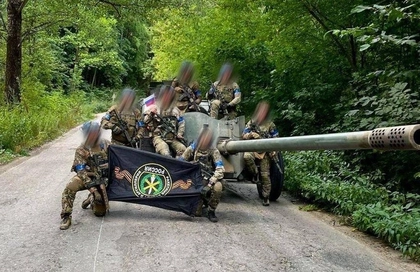A Russian 2S4 Tyulpan (NATO: M-175 “Tulip”) 240mm self-propelled mortar was struck by an FPV drone, according to a report on Telegram by the Third Assault Brigade of the Armed Forces of Ukraine (AFU).
The post said that Russian troops were being held back by the Third Assault Brigade's strong defenses and attempted to break through by attacking from the flanks using the mortar:
JOIN US ON TELEGRAM
Follow our coverage of the war on the @Kyivpost_official.
“Fighters took off in support and hit a super-powerful target—a mortar designed to destroy the most fortified fortifications and entire buildings.”
The report included a video with the comment, “The enemy is advancing on the flanks in the Kharkiv region: video of the defeat of the Tyulpan mortar!”
Drone footage first shows an image that locates and identifies the mortar itself and then the moment the drone hits it. The following frames, taken from another distant position, show explosions and resulting from the Ukrainian FPV drone strike
Kyiv Post could not independently verify the date and location of the footage or confirm the target as a Tyulpan mortar because of the low quality of the video recording.
The 27.5-ton 2S4 Tyulpan self-propelled 240 mm caliber mortar has a firing range of 9.5 kilometers (6 miles) for conventional mortar rounds and 19.5 kilometers (12.1 miles)for rocket assisted projectiles. The standard load for the 2S4 is 40 standard high-explosive rounds or 20 long-range rocket-assisted rounds.

Nukes Nukes Nukes! Kremlin’s Hawk Medvedev Extensive 2024 Use of Nuclear Bluff
The primary advantage of the 2S4 Tyulpan in urban combat is that its high-trajectory fire, allows it to fire from behind cover. The 240-mm mortar round contains 32 kilograms (70.5 pounds) of explosives, significantly more than the 7.5 kilograms (16.5 pounds) found in standard 152-mm artillery rounds, providing potentially immense firepower.
However, the 2S4 Tyulpan has some drawbacks, including its limited firing range, limited crew protection and poor mobility which impacts on its ability to “shoot and scoot.” The the mortar itself is readily identifiable both vsisbly and audibly when operating.
According to open sources, the cost of the 2S4 Tyulpan is approximately $800,000.
An earlier video circulating on social media showed what appeared to be a Ukrainian HIMARS multiple-launch missile system strike destroying another Tyulpan.
The video showed the mortar with its crew of five personnel visible on top of the vehicle. The footage then captured a powerful explosion, followed by thick clouds of smoke and the vehicle becoming engulfed in flames, and Russian soldiers were seen lying dead or injured nearby.
The 2S4 Tyulpan was first deployed during the war in Afghanistan, where it was used to destroy firing positions established in stone rubble and caves, as well as strongholds on roads, passes, and villages.
Russia also employed it during the capture of Grozny in the Second Chechen War and during the assault on the Luhansk airport in 2014. In April 2022, Tyulpans were spotted operating on the streets of Mariupol, before Russian troops occupied the city on May 20, 2022.
You can also highlight the text and press Ctrl + Enter






